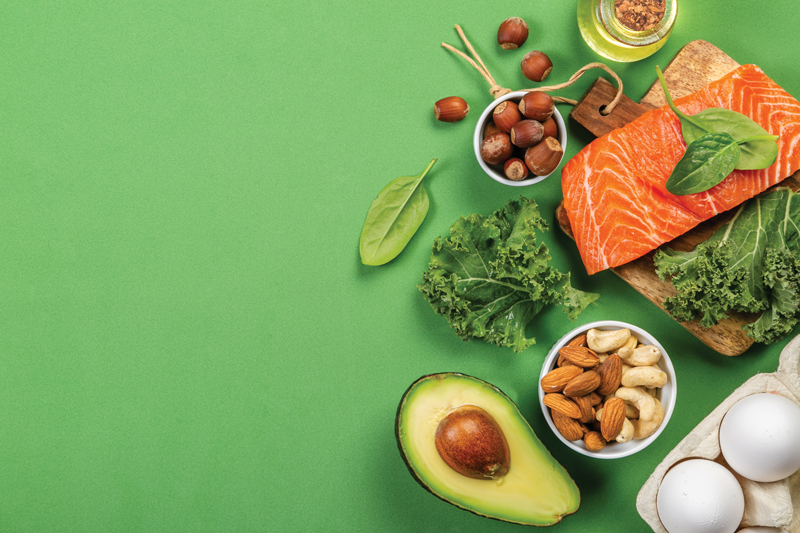I’ve been a type 1 diabetic for 13 years. After I was diagnosed, every endocrinologist and diabetes educator I met with told me to eat a diet high in grains, fruit, and starch. I was told this is the healthiest diet for diabetics. So I did this. What happened? I watched my blood sugars go on a roller coaster ride, spiking high then dropping low. After meals I would go up to 150-200mg/dL or higher. My A1c was around 7.0%. I counted carbs like they asked me to do, properly dosed my medications, but never ended up with normal blood sugars like a non-diabetic. When I asked my doctors about this, they told me what I experiencing was normal, and I was doing great.
The Keto Diet for Diabetes
I began researching diabetes and nutrition and quickly learned that healthy, insulin sensitive, non-diabetic people have average blood sugars in the 80s, and A1cs around 5.0% or lower. Shouldn’t my goal be the same? I experimented with several diets, but I found that only one normalized my blood sugars, a low carbohydrate, ketogenic diet. Instead of spikes up into triple digits, I had blood sugar graphs that were basically a flat line in the 80s and 90s. I again went to my doctors and asked about this. I was thinking they would be happy to see such amazing results. Instead I was told, “Eating this way won’t do you any good, and the elevated blood sugars you had before aren’t going to harm you”.
Carbohydrates and sugar raise blood glucose, why should diabetics eat a diet with mostly these foods? This didn’t make sense to me so I started my master’s degree in nutrition followed by my doctorate in naturopathic medicine. As I continued to educate myself I found that my physicians couldn’t have been more wrong! The high blood sugars I had in the past were damaging every cell and organ in my body. Eating a diet with high amounts of carbohydrate makes normalizing blood sugars a near impossibility.
Studies show beta cells (the cells that make insulin) begin to burn out and die when blood sugars get to about 140mg/dL – 155mg/dL. Those with fasting blood sugars even as low as 110mg/dL (like many prediabetics and some undiagnosed) already have signs of beta cells destruction. This is what eventually will make a T2 diabetic insulin dependent.
Eyes and retinas are a common complication in diabetes. Research has shown that retina disease begins occurring even at pre-diabetes levels (5.7%-6.4% A1c). This leads to impaired vision and even blindness. Diabetics are at an increased risk for cancer. It may be surprising to hear that risk of cancer increases even at “high normal” levels. Meaning if you have blood sugars within the standard range, but at the high end, you are at a higher risk for all cancer.
This same pattern of mildly elevated blood sugars and organ/cell damage continues through other systems in the body, like the kidneys, heart, nerves, and others. Those on the keto diet with normal blood sugars also improve their cholesterol and lipids, especially HDL and triglycerides, which are the biggest predictors of heart disease. The keto diet done right allows for blood sugars to stay in a very stable range around 80-90mg/dL. No other diet seems to be as effective.
How Do You Do Keto Right?
You can do the keto diet the right way by focusing on whole foods (avoid keto bars, shakes, or packaged snacks) with meals centered around a healthy protein source plus non-starchy vegetables like leafy greens and other fibrous veggies. Many people incorrectly do keto by doing a “low carb, high fat” keto diet, or LCHF, with the goal to ramp up blood ketones. Blood ketones are fine and healthy in individuals eating a protein focused keto diet, like I recommend. The body will make ketones as it needs. However, eating high fat to keep ketones constantly elevated offers little benefit (unless you are using the diet for something like Epilepsy), and people tend to overeat calories this way. LCHF keto also limits protein, which is not healthy. Eating meals like this are delicious and incredibly healthy.
For 10 years I have been eating this way, and my a1cs are consistently under 5.0%, the last one being 4.8%. I get the same results with my patients. Maintaining blood sugars in this range ensures all the complications of diabetes are avoided. For those with diabetic complications already, getting blood sugars down to this level allows organs and cells to heal from things like retinopathy, neuropathy, gastroparesis, and others. The science has caught up to what many of us have known for years: A keto diet is a great way to achieving normal blood sugars and optimal health.
Dr. Ryan Attar is a naturopathic physician and nutritionist practicing at Connecticut Integrative Medical Center in Fairfield. Dr. Attar has been living and thriving with Type 1 diabetes for 13 years. He helps his patients thrive as well, despite ANY diagnosis.
www.DrAttar.com
dr.ryan.attar@gmail.com
203.717.1339
